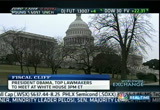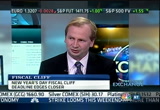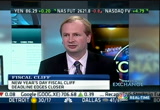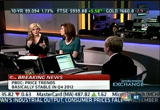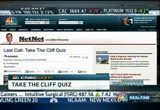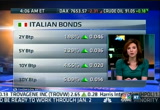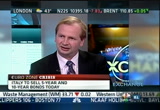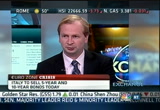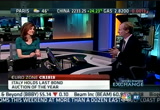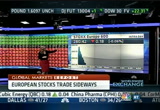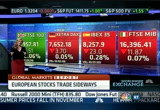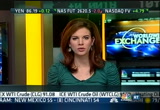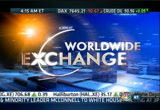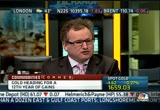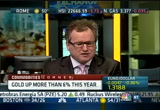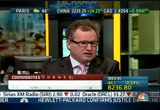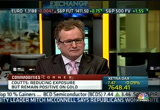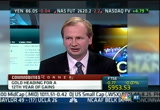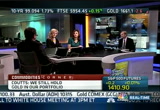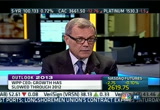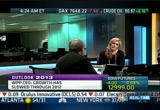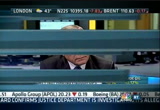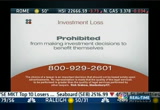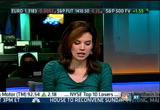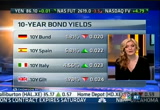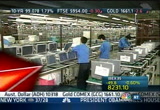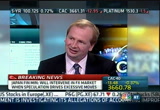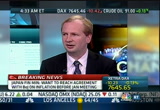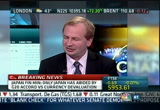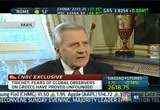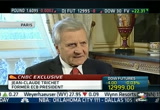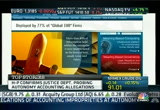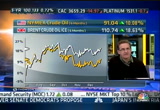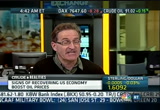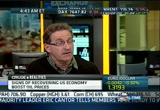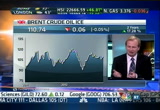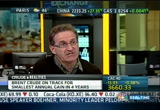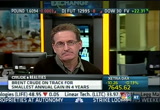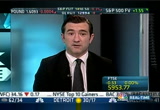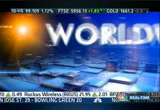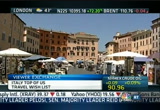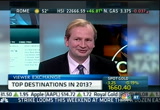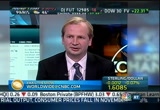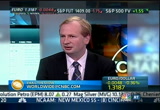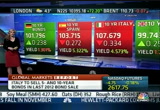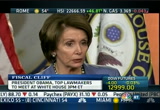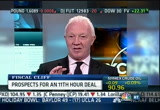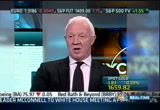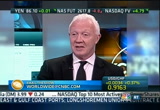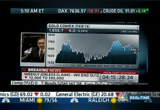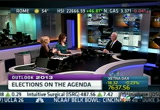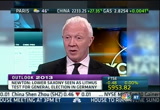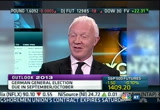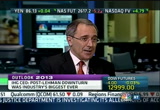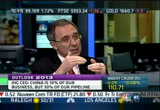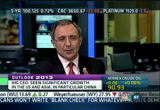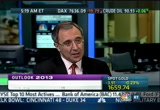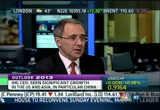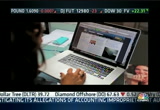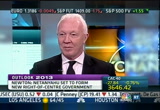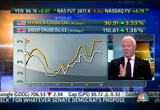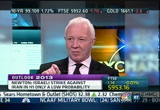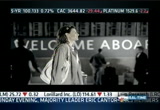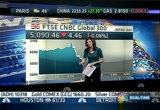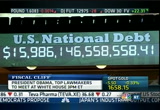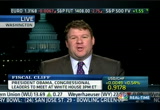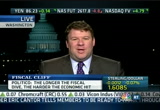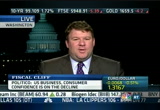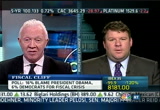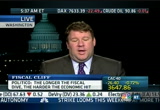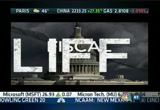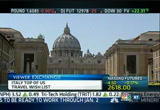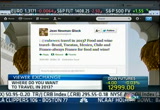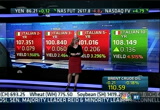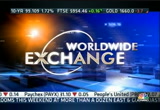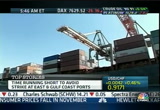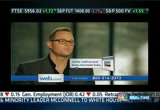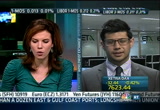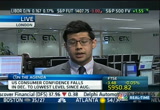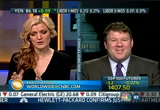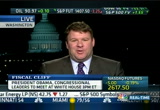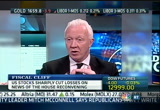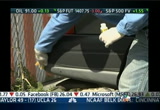tv Worldwide Exchange CNBC December 28, 2012 4:00am-6:00am EST
4:01 am
welcome to "worldwide exchange." i'm kelly evans. >> yes, hello, everybody. i'm louisa bojesen. these are your headlines from around the world. >> president obama calls congressional leaders to the white house today in what could be the last chance to come talk before the u.s. falls off the fiscal cliff next week. investors are bracing for the final eurozone bond sale of the year. italy will sell up to 6 billion later today. >> and the yen has been sent lower and stocks to their highest level in 21 months. this is the final "worldwide
4:02 am
exchange" from london of the year. louisa is here for it. >> i can't believe it. it's my last working day of the year, as well. >> is it? >> yes. >> unfortunately we'll still be talking about the same thing we're talking about now. >> although i feel we'll be talking more debt ceiling, as well. >> and speaking of which, president obama is trying a last ditch effort to restart budget talks days before the u.s. goes over the fiscal cliff. speaker john boehner has called the house back into session sunday evening. house majority leader eric cantor is telling his members to be prepared to work through january 2nd. both sides are still far apart on taxes and spending cuts. harry reid says prospect deals by monday are unlikely. minority leader mitch mcconnell says there's still time for an agreement. >> republicans aren't likely to
4:03 am
sign a blank check just because we find ourselves at the edge of the cliff. that wouldn't be fair to the american people. >> now, a new reuters poll shows americans blame republicans more than democrats or president obama for the fiscal crisis. and when asked who they held more response, 27% said the gop, 6% pointed to the dems and 30% said all of the above. for more on this, we're joined by christian schultz from barronberg bank. welcome. so we're going over the fiscal cliff. >> well, the consumer confidenc already be over the cliff in terms of confidence already. that might already be the first impact of the crisis of -- not of the crisis, but yes of the fiscal cliff. it seems we have this moment where this animal goes over the cliff, all limbs are still rotating around and we're staring into the abyss and
4:04 am
eventually we're going to fold. >> i love that mental image. >> but it was the expectations component of that confidence data yesterday that was responsible for the headline decline. what's interesting is the current component continues to increase. when you look at the drop in gas prices, the job market held up okay, it should have been a pretty good holiday season. confidence taking a bit of a hit. maybe you can finger the fiscal cliff here. >> absolutely. the housing market is improving. that is actually something that should really support the economy going into next year. so the potential growth rate, if we were not talking about fiscal cliff or any adjustment at all would probably be quite high, higher than we've seen over the last years. could be in the rake of 3%. plus, that confidence impact that these negotiations are likely to have, and that means that the u.s. economy is still going to grow at relatively mediocre rate of probably 2% next year. that's our view.
4:05 am
>> timothy geithner here in the past couple of days talking about the debt ceiling and what could be done to try to move that forward in a stable manner if you would. there's no way around it, right? do you think that's taken kind of a bargaining chip away from the fiscal cliff negotiations? >> there seems to be some politics behind this announcement right now as we hit the ceiling. as you make the calculations, it seemed to me as if they were only going to hit the ceiling in february or march next year anyway. the fact that he comes out and says actually we're shutting the ceiling now and i have to make all these adjustments so we hit only in february seems to me that there is a bit of politics going on already and trying to increase the pressure on the republicans to agree at the year end. >> i wonder how much is priced into the markets. despite the fact that we're going partially over the cliff or doing the coyote/roadrunner
4:06 am
thing in the air, i'm just not sure that we are necessarily going to see a huge move. among other things, it seems the market is tired of the political wrangling'. >> indeed. i think what is priced in is that this is priced in at a slope. it's something that's going accumulate over the year and is going to hit the gdp if it really hits over the course of the whole year, not all in january. it's not going to be a cliff but rather a slope. but this confidence, they are not so sure that's priced in. >> and you're staying with us for the rest of the hour. if all of this hasn't sent you over the edge yet, stay the cliff quiz on our website. have you taken the quiz yet? >> i looked at it. i did not do very well.
4:07 am
there were some pop things in there that i didn't get. see if you can do better. it wouldn't take much. greece's national bank euro bank alfa and perez says they need the money following disclosures by the lenders last week. greece is concerned that the 50 billion euros set aside for bank recapitalization will be enough to cover the shortfall. and the italian treasury is holding its last debt sale of the year. traders are expecting to see solid demand for the paper after rome placed nearly 12 billion euros of shorted dated paper just yesterday. still, they warn investors could become more discerning in the new year especially as the italian electric tore ral race on thursday. italy expects to raise around 10
4:08 am
billion euros next year. less supply. we know there's still plenty of investor demand and no sign necessarily of re-ignited concern about the longer term health of these -- you could call them peripheral economies. >> no. things have really improved. it's all still down to the ecb's pledge to support these countries if they fulfill the conditions. especially in the case of italy. the country is fulfilling conditions of the ecb if it ever got into needed. it made the fiscal adjustment that was needed. if the country exits recession which we expect to happen next year and the growth at a potential growth rate of say 1 mers, 1.5%, with inflation under control, with interest rates back to levels which were normal for italy before the financial crisis, then all these adjustments altogether show that italy can go back on to a sustainable growth path and -- >> is that with or without berlusconi involved? because end of february are
4:09 am
these elections. >> yes. the elections are, of course, more the campaign heading into the elections with all these noises, especially the end ecb noises that we hear from italy. that's going to cause concern that if italy does need help, how likely are they going to be to get it? in the years from 1993 to 2007 italy brought down its debt to gdp ratio to almost 100% and half of that time berlusconi is prime minister. it's not like berlusconi has a record of fiscal spending. >> no. but i guess also the times were different. >> the times were different but the interest rate was slightly higher than it is now. but the primary surplus of the country ran over that period which was an acceptable 3% on average is already right now reached once again. so all the parameters are in the right place and the only thing
4:10 am
the next government needs to do is actually nothing. if it does nothing, if it doesn't reverse the reforms -- >> what's interesting is what berlusconi is campaigning on is austerity. he's running on an ant anti-austerity pro eu package. while it's untenable, it does have a certain amount of certainly backtracking the fiscal returns for them. >> exactly. this property tax, i think that's a cause for concern. if you were to repeal that, the fiscal position on would be unsustainable and he would have to raise taxes elsewhere to make up for that. that would be some messy negotiations with him on a european level. markets would be very concerned already heading into the elections. the more noise we hear, the higher italian borrowing costs would be and if italian borrowing costs rise, one of the very important parameters which led to this drop in debt to gdp over these 15 years heading into
4:11 am
the crisis would not be fulfilled any more and italy's position would be unsustainable because of all that noise. >> it sounds like a catalyst should this fall into place in 2013. that still remain toes be seen. christian will stay with us. standing in front of our pan european markets map and you'll note that we're seeing more red than green on our screens right now. just a recap. we came back into the market stateside on wednesday trading lower with some nervousness arising. even the latest comments about not being able to come to a full solution on the fiscal cliff. equities falling on wednesday in the u.s. on thursday when we opened here in europe, yesterday we saw a relatively stable markets. we closed out on a flat to slightly higher note for most of our european markets yesterday. this morning coming into trade, we're pretty flat. we've taken a bit of a dropdown on this drop but we're just a couple of points lower. in the asian session overnight,
4:12 am
we managed to see gains back again. they lost again on the notion of the fiscal cliff not happening. shanghai composite higher by just over 1% in today's session. hang seng, and the kospi closing slightly higher across the board. the european markets mixed, but the ftse 100 still flat to higher. we're all looking towards these fiscal cliff negotiations. at the moment, we've got a couple more days of trade before we get to the end of the new year, as well. most analysts out there, they've been saying we're going to see a relatively flattish end to the year from where we are now given that we've seen such an increase of equities in the past 12 months. we've seen stellar outperformance from these european markets. also the periphery markets incidentally, too. bond markets, the fixed income markets, here we're seeing
4:13 am
buying in germany at the moment and 10-year german bund around 3%. a little bit of buying into the gild as well as some of the safe haven trades back on. we have this italian bond auction. the first one is going to be settled in 2013 and the last one in this year, as well. it's thought that it is going to see solid demand given that it hasn't gotten any trouble getting off the ground as of late with those bond auctions, as well. a quick wrap on the forex market. here you're looking at selling in the euro/dollar right now. 1.3190. we're flirting with the high level of this trading range that we've been stuck in. dollar/yen, it's thought when this new japanese government coming into place, they're simulating the economy and to make sure a weaker yen is in place, as well. kelly. >> louisa, thanks. we're keeping an eye on gold today. could the precious metal be losing its luster come 2013?
4:14 am
4:17 am
welcome back. gold is gaining today. this year, higher by somewhere in the region of 6% plus. so underperforming the broader equity markets, but nevertheless, still a nice gain. kutz has reduced its exposure to gold for the first time since 2009. joining us is allen higgins, chief investment officer for the uk coutts. good morning. >> good morning. >> so we've had 12 years of exposure to gold. you're limiting it now. why? >> it's starting to lag, but more subtly from a portfolio construction perspective, it's lost its negative correlation. for example, quarter 2010, well, euro crisis won when we had equity markets down a lot then gold really surged forward, giving a negative correlation.
4:18 am
and so for the portfolio manager at coutts, it has been at times a legal high gold exposure surging upwards in times of stress. for those days seem to have gone. trimming it. that is a fact that there's a real shortage of low risk investments of on german bunch negative. >> but you're saying it's trading like other risk assets at the moment. >> at times, it's correlated with em. so it's less attractive from a portfolio construction perspective as compared to what it was. >> it's fascinating because we've been talking about one theme for 2013 being is it a stock picker's market, are we seeing less differentiation, what you're saying would suggest that gold has become one of these assets that isn't in its own world, that has started to trade with everything else. >> from an ideal perspective, what we're looking for. it's easy to buy equities or high yield. we're looking something to hedge
4:19 am
that. and for a while, gold fulfilled that role. but now it's increasingly hard. to be fair, it's hard to find any negativity. >> so what takes its place? >> pretty hard, to be honest. government bonds still have a role. government bonds with credit on top if you like. so we were one of the first private banks to buy ultra long corporate bonds normally held by pension funds reflecting the fact that you have above average risk premiums and potential risk correlation. so that's attractive. an area that's really suffered, ctas. >> ctas? >> ctas really suffered. >> what are ctas? >> commodity trading advisers is what they're short of. it's a style of hedge fund management and it did very well in '08 and '01 or '2. they've struggled for a couple of years. but still importantly they still have a negative correlation.
4:20 am
>> i'm just wondering what happens with the cliff impact on gold. you know, if we find the cliff solution, if we find a mediocre solution, if we find no solution, are we going to see a huge swing in the price of gold? >> well, gold has a safe haven role. it has had a safe haven role just like other assets that you mentioned that could be hemgs against equity movements such as these safe haven bonds such as german ones, u.s. ones, maybe japanese ones. if the u.s. goes over the cliff, if confidence starts to rock around, if we have financial market turbulences, demand for safe havens should go up. we already see these small movements with very well volumes where there's a little bit of money flowing back into safe havens now. i would expect gold to have some role in this, as well. >> what's interesting is given that and given all the reasons why people have historically liked gold, you would have expected it to be a strong asset
4:21 am
class in the second half of the year, maybe with some of these uncertainties around. but that wasn't the case. it really underperformed and that has caught so much attention because it suggests people, you know, what really are the drivers here? >> yeah, quite. so safe haven less so, but still what you're seeing is em central banks continue to add and essentially if you like catching up with some of the nations. iraq add to gold as well as the many other em central banks. we still own gold, so we're still looking for it to rally. but just the case for holding substantial amounts in gold is somewhat less. >> but i mean, just looking at that, some of your musings and some of the general musings out there, this seems to be a notion that if we see some of the fiscal cliff agreement reached we could see a gold play and if we don't see a fiscal cliff
4:22 am
agreement reached, gold could see a buy. >> when you look at this income theme, which we think is still very important and for next year a secondary income theme, growing dividends, second commercial property, it has a lot of competition to do. we still own it. we've trimmed it. it's still a bit of a mixed message of gold. >> yeah. i think another role of gold is as an inflation hedge. and there i think the outlook is pretty negative, actually. because inflation is going to pick up and make gold a good investment. inflation, given all these weak economies in the world does not look likely to pick up. and that should reduce demand for gold. even the fiscal cliff, if the outcome of the fiscal cliff is a bit more austerity in the u.s.,
4:23 am
that should drive down inflation. >> we've seen a portfolio structure adding gold in that 12-year period. if you start to remove some of these buyers from the market such as a coutts, will the buying from central banks be enough to support the loss of that investor class? if you guys aren't the only ones looking at this saying it's time to pear back positions, it's not suggesting a good outlook for next year. >> we're keeping some positions in gold. >> so your portfolio exposure, what was it at now? >> we were at the order of 8%, now we're at 5% or 6%. bear in mind this is at a 20% volatility easily. so it's a relatively big contribution to our clients' risk profile.
4:24 am
>> we'll leave it there. thanks so much. >> thank you. well, wpp may be the largest advertising and consult iing company in the world, but ceo's martin sorrell says he has some regrets about what he didn't enter in 2012. >> it toughened up as we started the year. having done 4% fft fist quarter, we were feeling optimistic and we said it would be better than 4% at the end of the year. from then on, it started to go down. we had 3% growth like for like excludeing acquisitions. interestingly, we got into quarteritis which is companies seemed to be looking at quarters instead of calendar years.
4:25 am
there was a finite limit to what companies could do in terms of reducing costs and they would have to focus more on the top line. that proved to be very true because a number of companies missed the top line forecast. so in october, however, we saw a bit of a recovery from q3. and our flash figures were 2% and we did 2.5% in october. we have not told the market what we did in november, but it was better than october. and so we've ended up, you know, towards the end of november after november up by 3%, a little bit more than 3%, actually. and december we have to wait and see. are you going to try to diversify further outside of europe? >> well, you know, if i do have any regrets, and i have a few over the years, i'm willing to admit publicly. it would be that we didn't have
4:26 am
enough in our operations, that we didn't have enough in asia and latin america, africa and the middle east and europe. some some of our clients have got 40%, 45%, 50% and they benefit as a result. the other part of it is i wish we had not just one-third of our operations in digital here on cnbc and that we had, let's say, 40%, 45% there, too. the pattern you'll see in 2013 is meets ya, application to our business and we specifically are going to get people to work more and more together in order to deliver more effective and efficient advertising and communications for our clients. >> if you have any regrets, share them with us here. >> never have regrets.
4:27 am
4:30 am
president obama calls congressional leaders to the white house today. a lackluster trading week of the yurp, ewe european equity markets are scheduled to post double digit results for 2012. >> italy is expected to see solid demand when it sells up to 6 billion years of longer dated paper today. and japan's finance minister is saying other companies have no right to lecture japan on its currency policy instead calling for the u.s. to seek a strong dollar. okay. welcome back to "worldwide exchange" this morning. let's take a quick check on trade as we close out the last full trading week of the year. not even a full week, but just one of the last trading weeks of the year. >> monday seems so far away.
4:31 am
>> it's just kind of sticking out there, the 24th and 31st. european markets were closed for boxing day week. got back into trade yesterday. sort of a mixed bag across the board. u.s. markets were weaker and this morning europe is following the u.s. down that path. the ftse just a little bit lower. the xetra dax down by .1%. the cac 40 which was one of the strong performers yesterday giving up some of its gains. the ibex 35 underperforming. >> the penny stock not worth a whole lot so you have to take that into consideration. but yeah, drifting lower on the bond markets. today we have this italian debt auction which would be interesting. we've got rome offering somewhere in 2 to 3 billion euros worth of bonds. what we've seen in the recent bond auctions, as well, and as we've been saying it is the last bond auction for italy in 2012. it will be interesting given that we're looking at these early elections, now, as well.
4:32 am
currently markets? >> the euro/dollar is lower this morning. down by almost .4%. a pretty sizable move lower again in light trade, but keeping an eye on the dollar/yen. a little higher, though, 86.14. we've seen that rally significantly this year. we're getting comments out just from japan's finance minister and this follows the data that has increased speculation about further stimulus. that's responsible for some of the increase we're seeing today. indeed, poor industrial data has increased pressure on the bank of japan to help stimulate the country's economy. japanese factory output fell more than expected 1.7% in november. core consumer prices weakened. the country's new prime minister has promised to increase government spending and take on aggressive monetary easing. we're getting comments from one of his newest cabinet members. that is the finance minister taro asso. he's saying the u.s. should seek a strong dollar that only japan
4:33 am
has abided by the g-20 accord. he says other nation ves no right to lecture japan on currency policy and says that we are not seeking a draft pick fall in the end. so defending japan's position there just a bit. christian schultz is still with us. christian, you know, do you take these comments at face value or should we expect that, in fact, japan is quite seriously waging a currency war here? >> i would not call it a currency war. the japanese currency is still overvalued. it still has that safe haven role. a lot of money has flown into it and that is going to flow out again as things improve elsewhere. especially in europe. so even if the government was not trying to actively push that development, i think we would see a depreciation in the yen anyway and just stepping up the pressure here because clearly japan is back in recession and they need to do something about it. >> what i wonder is if you look at the performance of the nikkei
4:34 am
this year, the performance of the yen, the yen is having its weakest year since 2005 and in the mirror image the nikkei is doing quite well. but this all rests on shinzo abe's administration and the bank of japan delivering. should we expect they'll be able to succeed? >> it is a bit of an experiment. if they really change their target for the bank of japan to the 2% inflation target and they -- then they have to find these instruments to actually achieve it. because they've done what everybody else has been doing. they've printed money, they've created this huge fund to buy up assets, which, you know, they're ever increasing and they're ever increasing the rate of monthly purchases up to where it's quite similar to what the u.s. is doing. but still, they're not achieving a higher inflation rate. it does seem to take the government to spend more, as well. now, the government has been running huge deficits for a
4:35 am
while. >> i still find it fascinating looking at the basis of the actual market. given as you say we're about to enter a recession again. you brought a very, very divided and different government scenario which hopefully will be sorted out. but whether or not the japanese underperformance on the nikkei is going to continue, as well, given the comments we've had about the stimulus will flow into the economy. >> the japanese economy is still or at least the large companies are still very export oriented. if the yen depreciate appreciations, that should improve the chances for japanese companies to gain market share all over the world and that should improve earnings prospect, too, and drive up shares. i see that quite simplistic and there is upside if the yen really tanks. of course, we have to keep the currency movements in mind if you're an international investor, of course, examine japan, of course, has a domestic economy, too, which is likely to remain quite weak. that is the down side, as well. all other things being as they
4:36 am
are, if the economy picks up, if the yen appreciates a little, i think that should be quite positive for japanese stocks. >> in which case might be a bright spot for the global economy, too. brazil's central banks has moved to move investment to ease the bank rules. the bank will cut requirements by 20% in cases where they're back by a capital goods investment program. this move is expected to make around 7.3 million dollars available to tackle underinvestment in industry. perhaps calling this necessarily intentional currency appreciation, but it was practice zill's finance minister who coined the wars back in 2010 and here we are again talking about these themes. >> here we are again talking about greece. greece's banks in fresh capital were gop going to go down to central bank. national bank, euro bank, alfa and peres need the money to close ratios following last
4:37 am
week. greece confirmed that the 50 billion euros set aside for recapitalization will be enough to capture these shortfalls. stephane pedrazzi asked the ecb jean-claude trichet about greece. >> i think it is absolutely clear that out of the fears of the global observers have proved unfounded. i was always confivinced that i was unfounded that the assumption that they could leave the euro area, that they could refeud the adjustment which is necessary were wrong assumptions. and now we see and of course it's difficult, of course it's hard, it's tough. but people have to make adju adjustments which are very, very difficult. but, again, we are going in the right direction. again, it's very difficult. it goes in the right direction. >> you don't believe in the scenario for greek exit? >> no..
4:38 am
it's precisely because it appears very clearly that neither the greek people nor the greek government nor all peers wanted that, that contrary to a lot of, you know, fears, that that being a little bit erroneous, but were generalized in the other continents, if i may. but now the europeans are making their point clears and clearer and clearer. and, of course, it is recognized. >> what's your view on spain? the country managed to avoid bailout so far, but will not meet its deficit target for the full year. do you think spain should be given more time? >> well, first of all, i think that, again, spain is going in the right direction. when you look at the current account, the deficit, you see that it had been diminished massively since the peak that they had in 2008, 2009.
4:39 am
and, you know, as a very short summing up, it's been divided by more than five, though it's very, very encouraging. on the other hand, you have unit labor costs which have been diminishing quite a lot and the exports of spain are very dynamic today. so it also demonstrates that hard work is being done. it's difficult. it's tough, but going in the right direction. i trust that the global observers are observing progressively and the adjustment is proceed. in spain and in all the countries that are under adjustment. >> now, lonmin's ceo ian farmer is stepping down while being treated for a serious illness
4:40 am
after being first admitted to hospital back in august. the south african miner says it's already appointed an executive search agent to find a successor. and porsche's billion dollar battle with a group of u.s. hedge funds won't need to be heard in a u.s. court. the appeals division of the new york supreme court has ruled there isn't enough connection between those events and the new york state to justify the case being held there. the court ruling noted that germany's legal system would provide an adequate alternative. certainly not the last chapter in that saga. >> no. probably not the last saga in this, either. hewlett packard has suggested the u.s. is looking into questionable accounting practices. last month's ceo meg whitman used that as the basis for a nearly $9 billion write-down.
4:41 am
the ex ceo mike lynch continues to defend the company's accounting practices. hewlett packard, a little higher in german trade this morning. but down by 20% of its value. >> not a pretty quarter for hewlett packard. brent crude has climbed above the $100 a barrel mark as u.s. lawmakers attempt to avoid the fiscal cliff. but crude is poised to post its smallest gain in three years. wti is set to post its first annual last in four years. ian, welcome. we've seen this sharp decline in oil prices helping seek through to prices with a lot of americans in the last several weeks. when we look to 2013, should we expect a similar seasonal pattern which is to say a rally
4:42 am
during the first part of the year? >> no. i'm not expecting a rally in the fist part of the year, to be honest. what we're still trying to take is the impact of shale oil, shale gas. and i think probably in 2012, the impact was -- or rather the implications of the impact were a much higher than expected. this year it's going to be interesting to see how the rest of the global acts with the new higher expectations for u.s. oil and gas. >> but does that really feed through? because we've heard the big longer picture argument, clearly a game changer, huge implications. how much of that feeds into oil prices right away? >> well, i think in terms of what's happening the first half of the year for the u.s., it's the fiscal cliff. there is a real danger that u.s. economic growth could be weaker in the first half than people are expected and, therefore, the
4:43 am
implications for oil prices will be negative. but the other thing, of course, that you have to look at and the other side of the equation is the supply side. at the moment, really we've got to see what opec wants to do. last year, the impact of the embargo wasn't -- was like a six week impact and it was forgotten about very quickly. and if you think about it, last year was a very, very steady year for oil prices. wti, as you said, is going to post the lowest rise in several years. in fact, i looked back in my forecast that i had for wti at the beginning of 2012. and it was $111 $a barrel. i moved it down to $110 in the middle of the year thinking it might get a little weaker and poked around and did absolutely nothing. >> i wonder whether the question is going to come back again into
4:44 am
the oil markets given that we're looking at the israeli elections coming up in january. but back to the u.s. story, i find it hugely interesting, this notion of u.s. becoming energy independent on its own. do you really think it will happen? because i still talk to a couple of people in the oim and gas industry that say, you know what? it's a far cry from the reality out there. we're still going to see the middle east being the dominating oil exporter. >>. >> i think in terms of any oil forecast, my experience is i'm lucky if i can forecast the oil price more than six months. so to forecast it eight years out, what's happened also is in terms of supply is that last year another reason why the oil price got held up was that we had problems in the north sea.
4:45 am
the only nonopec user who came up with the goods was the u.s. everybody else failed as they always do. >> i was just wondering, christian, what your thoughts are. also, we were looking at the higher oil prices. higher being anything north of 100 at the time saying it's going to slow down a recovery in markets. this time around, now we're using to prices being in the region of 100. but what are your thoughts when you look at oil at the moment? >> well, we've had these two years where in winter we've had these big oil price rallies. so we've had this seasonal pattern and that has translated in higher inflation rates in the west which put some central banks under pressure to do something against rising prices or at least not do stimulus as much as they have. the expectation for next year is clearly not strongly rising oil
4:46 am
prices, at least not in the very beginning of the year which takes the pressure of central banksz to react to that. this means stimulus is easier to pass in, say, a governing council meeting or an fomc meeting if inflation rates are lower than they would have been maybe a year ago or two years ago. so from that perspective, of course it's a good thing if oil prices don't rise as much. >> ian, you nailed the 2012 brent call. $111 is a barrel. what is it going to be for 201213? >> i've got 105 in. i have to say i think it's going to be a pretty weak year. going back to points we made about 2010 and 2011, 2010, the arab spring, that was a big surprise. 2011, sorry. 2012. and we had the iranian situation, as well. in the first quarter, oil prices up, brerchbt was up to 120 before it came back in 2010.
4:47 am
always a problem with making the forecast is the political situation. there are some very big talks with regards to the iranians and the nuclear program and around april, i think it is, and at the same time know when you look at some of the websites, the possibility of action maybe by the israelis ahead of that because they're not confident that iran is going to do anything. so there's always sort of that impact on it. i just feel this year, though, as the year when people start to set things right, just how accurate is the idea that north america could be energy self-sufficient in eight years? there will be a lot of questions about that assumption. >> talking about the imports of u.s. shale gas, expanding these
4:48 am
shale imports as much as possible, one economy needing the oil from another. but we'll see the 105 call for 2013 pans out. thank you very much. speaking of looking ahead, it's a hard one, isn't it? how should investors be positioning themselves as we head into next year? we'll leave but a look at what some experts have been telling us. >> you have to be aware of the idio sin accuratic risks out there. if companies can finance themselves at very low levels, as long as we don't get a big back up in interest rates or yields for any reason due to sovereign risks elsewhere, i suspect the cycle is going to remain quite low. if you look at where valuations are, in that case, valuations are still even after this big move we've had in the last six months compared to whether the default cycle is still look reasonably valued. >> if first half of next year doesn't look all that great.
4:49 am
we're counting on second half for next year after there's momentum. once the fiscal cliff gets resolved, we think there will be more momentum on the hiring front. hiring will lead to further consupgz gains and that will encourage firms to invest. that's how we get the cycle started. >> the new nuclear is a completely different issue. the cost there could be quite considerable. now with the market prices that you have, you're looking at the wagz with governments just like in the uk have to come upith some kind of support mechanism to make that equally viable. i think that's going to be the same across the world. i don't see europe as a whole changing its mind and going to nuclear. if you take germany, why did they change their minds? obviously, there were safety concerns, but more importantly, it was to do with the ballot box. there was quite a lot of opposition from the public in germany, people out on the streets protesting against
4:50 am
nuclear. at the end of the day, the politicians decided to take what i consider to be a political path rather than an economic one. >> i don't think we would describe it as positively rosy just yet. we're saying that the storm clouds are lifting. but as you're hinting, there are still some big question marks about economic growth in 2013, particularly in the euro area where we're not expecting very much more than a flat economy at best. gdp growth is only a small part of the story. a lot depends on what's priced in to begin with. how the news flow compares with those expectations. underlying levels of valuations flow into funds. we think that looking at things in the round, even though there isn't much growth in europe, we're expecting european stock markets to do quite well again.
4:53 am
4:54 am
in second and third. the closest european competitors, they were the uk and france in joint plays. >> i was hoping maybe the uk would get an olympics boost, but it appears to be still trailing italy by quite a ways. but there were no italian locations in the most instagram places until the world. six california locations made the list. and the top two places most snapped and shared on instagram may surprise you. they were the shopping mall in bangkok, thailand t b, and the sunni's airport. >> where is your top place that you would like to go, christian? >> i think i go with the americans here. i think it looks most likely that we're going to be in italy. >> i thought you meant he were going to the americas. but that's all right. >> i'm going with the americans will be. >> where in italy? >> sicily.
4:55 am
sicily looks -- first of all, it's some place i've never been. in london any time of the year but certainly in summer. >> are you an instagram user? >> i am not. >> where do you want to go, kelly? >> in 2013? >> yes. >> i suppose i get around to see more of europe. i would love to go to russia and see moscow and st. petersburg. >> don't go in the wintertime, that's all i can say. >> and yours? >> i used to do all the die hard type travel adventure stuff and now i just want a nice beach. mall tease you can never go wrong or the greek islands. i've never tried that yet. so that has to go on the list, as well. >> sounds good. >> for the weekend, quick jump to italy. >> i still haven't been at all. so add me to that list. i'd go anywhere. >> you can join christian and the family. >> thank you for the invite. i'm looking forward to it.
4:56 am
>> sicily sounds beautiful. >> on that note, we would like to know where you are heading this year, greece, bangkok? dividually, too. us and reach us now that instagram is changing its policies, we'll see what its users will look like next year. >> i need to get on instagram, as well. i can't type on it. writing takes me 200,000 years. anyway, christian, next year, 2013, what type of a year do you think we'll get? >> well, 13 is not a lucky number, but i think it could be a lucky year for europe. >> i was born on the 13th, so thank you very much. it could be a lucky year. it should be better than last year. everybody has gone through a lot of adjustment, times have been
4:57 am
very hard. and i hope that by the same time next year we'll be talking about how will the european economy is doing and how much better we'll do in 2014 rather than all these worries that we have at the moment. >> we have a very, very funny director at the moment saying were you born in 1913. >> no. oil of olay. >> i just wonder when it comes to what you've mentioned about 2013, we've mentioned how it could be okay in europe. does that imply some progress for politicians or even if we leave things as they stand? >> i think there needs to be more progress, but i don't believe in that big bang solution where we get a federal europe or a break-up of the euro area as one of these being what we need. i think we need gradual progress. i think with the safety net that the ecb has provided, we have the time to make that gradual process, to think about things and gradually progress towards a more dynamic, more competitive economy here in europe with more
4:58 am
5:01 am
welcome back to "worldwide exchange." i'm kelly evans. >> and i'm louisa bojesen opinion. president obama calls congress back to the capital. investors are bracing for the final eurozone bond sale of the year. italy is expected to see solid demand when it sells up to 6 billion euros of longer dated paper today. >> and japan's finance ministers saying other countries have no right to lecture japan on its currency policy instead calling for the u.s. to seek a stronger dollar. let's take a quick check of
5:02 am
the u.s. markets. the dow, nasdaq and s&p 500 down four days in a row something on the average of 2% when it come to the nasdaq. we're seeing pointed arrows this morning, again. looking to shed three or four points at the open, similar small decline seen for the nasdaq and for the s&p. most are still well in the green for the year, although december will be a down month unless the nasdaq can turn it around quickly. european bourses, the ftse 100 just barely lower, though, not moving too much. the xetra dax is an underperformer, down about .3%. the cac 40 also a mirror image of what we saw yesterday. the ibex 35 is down almost 1%. the earlierer losses are starting to pick up. >> and i'm guessing it might be selling in the banking sector in spain. but the u.s. futures, though, just looking towards what type of an open, we're looking at you just look at that. the asian markets, rather, here in the overnight session, we saw
5:03 am
flat to a little higher trade on asia with the shanghai composite closing up by 1.25 percentage points, again, coming into the week after the holidays. we saw a little money coming off the table given the latest comments from timothy geithner at the time. now we're looking towards that fiscal cliff and whether or not the negotiations will go in the in the next couple of days. moving on and showing you the bond markets, as well, here we're seeing safe haven bye buying back into the uk guild, back into the ten-year bund yield, 1.3% at the moment. italy, we have a big bond auction coming up which we should be getting results from imminently. here a lot of people are focussing on what type of year it will be next queer for italy given that we have the early elections taking place. we'll update you on the bond results as soon as we get them. the currency markets, we're seeing a little selling against the dollar.
5:04 am
1.3184. as i was saying last hour, we're still on the under end of that tight trading range. the dollar/yen, off by a little bit. just reversing what we were seeing here this last hour. there's still a -- athought that we could be looking at weaker yen to continue and more stimulus heading into the japanese economy, as well, given the indications we've had out here over the past recent weeks, kelly. >> louisa, thanks very much for that. the top story today, president obama is launching a last ditch effort to restart budget talks days before the u.s. economy going over the fiscal cliff. the president will meet with congressional leaders at the whiteout at about 3:00 p.m. eastern. speaker john boehner has called the house back into session sunday evening. house majority leader eric cantor is telling members to be prepared to work through january 2nd. both sides are still far apart on taxes and spending cuts. spending majority leader says harry reid says prospects for monday are unlikely.
5:05 am
senate majority leader believes there is still time for an agreement to be reached. >> republicans aren't about to sign a blank just just because we find ourselves at the edge of the cliff. that wouldn't be fair to the american people. >> alistair newton joins us here as a new reuters poll shows americans blame republicans more than democrats or president obama for the fiscal crisis. 27% cited the gop is responsible. 16% blaming the president, 6% pointing to the democrats while 31% said they would blame all of the above for going over the cliff. alistair newton, you've seen the attitudes of the american people. i guess we're going over the cliff. >> i guess we are. got that one wrong, didn't i? >> so you expected -- a lot of people expected a resolution. does it matter that we're actually going to go over it? >> so far, markets are taking it surprisingly calmly, haven't they? we've seen a bit of volatility yesterday. but the thought that obama is
5:06 am
going to get people in a room today, you saw u.s. equities recovering a bit before close yesterday. it's going to be pretty interesting the next few days. i don't rule out total ly washington coming to its senses, but i have to say at the moment that the odds look rather against it. but there is still another option which people are not considering at the moment, and that is that we get a deal before the 12th congress wraps up on the 3rd of january, but after the 1i of january. the bush tax cuts expire and then the house republicans, who are in my view the real source of the problem here, we saw what happened last week when boehner tried to push something through. the house republicans want to cut taxes rather than raising taxes. but frankly, i think this is going to the 113th congress from where we are today the. do you think we're going to feel it on the real economy in the first quarter?
5:07 am
are we going to see this slight cautiousness feeding through in how -- >> well, first of all, we are seeing it on the u.s. economy already. there's no question about that. it has happened a distinct impact on corporate america's willingness to invest over the past several months, some say over the past year. that's likely to continue. even if we get a deal, what does this mean? it's a minimalist quick fix. it's not a debt and deficit grant grand bargain solution which obama and boehner were talking about weeks ago and it's probably not going to involve solving the debt ceiling problem. and, of course, we all saw what happened 18 months ago over the debt ceiling. it dragged on and on. bottom line, whatever happens in the next few days, markets, corporate america and consumers in america are probably going to have to deal with continued
5:08 am
fiscal wrangling' in washington for weeks and weeks and weeks. >> we're going to talk more about the fiscal cliff and later on in the show. just coming back to europe for a second or touching on europe -- >> even more boring. >> because i'm quite looking forward to next year and i'm looking forward to hoping that we're not going to be sitting on politicians the same way we have over the last year, two years, looking at every single line that comes out of therefore mouths. i'm hoping we're going to see march of a sense of normality coming back into the european trades. >> as mohamed el-erian said, it's the new normal. nothing is going to happen next year in all probability. there will be the italian electrics. if berlusconi starts to poll better in a run up to the italian elections, which i think will happen, then you're likely to see bonds markets reacting a little bit to that. that could cause problems in the spanish and italian yield curve.
5:09 am
so maybe that would that will trigger mariano rajoy asking for a bailout. anything which happens on the policy front, anything which happens in the next few months is going to be weighed for its impact on the election prospects come next september. >> you're lucky because we have a whole lot more europe after the break. we can continue to talk about all things european. but of all of this talk about the cliff, if it hasn't sent you over the edge yet, head on to our website and take the cliff quiz. see if you can match the right quiz with a number of things in. >> you can also take a look at what's on the agenda today in the u.s. a couple of economic reports wrap up the week.
5:10 am
both due out at 10:00 a.m. eastern. the chicago pmi is expected to show a reading of 51 this month, that would be up half a point from november. pending home sales, they're expected to increase 1.2% last month. we'll see if we can keep a better stretch of housing data coming. still to come here on the show, despite anemic economic growth across the globe, the hotel industry is bucking the trend and continues to expand as the ceo of ihg. we'll find out how in just a couple of minutes. [ male announcer ] this december, remember -- you can stay in and share something... or you can get out there and actually share something. ♪ the lexus december to remember sales event is on.
5:13 am
hi, everybody. welcome back. apart from obama winning a second term, new heads of state have been elected in france, in egypt and japan, south korea and russia. next year, key votes will be held in italy and germany where people will be heading to the polls in a regional election in january. our guest is saying that the vote in lower saxony should be seen as a litmus test for german chancellor angela merkel. a litmus test, alistair, do you think that we can look ahead and see whether or not merkel is going to do well or poorly when she goes to the polls? >> i think markets will be tempted to do that. the key point here, louisa, is
5:14 am
that the balance of power in sacksny is also a parallel to the balance of power in germany. it does look like the two main opposition parties could seize power from cdu in lower saxony, despite the fact that they're going to win the plurality. less than 5% in all likelihood, which means they don't get seats in the regional parliament. now, we could see that pattern repeated at the federal level. but at the moment, i have to say opinion polls in germany at the federal level are pointing firmly to a cdu/spd grand coalition after the election next september or october. does it matter? well, you know, a lot of people are saying if we finish up with an spd green government in germany, surely there will be more forgiving of the peripherals, more inclined to be helpful in the eurozone.
5:15 am
yes, i think theymight. which is not hugely in favor of paying taxes in order as they see it to pail out greeks, italian and spanish and so on and so forth and secondly the german constitutional court. now, the constitutional court remains a major factor in the whole of this paradigm. and what germany can do moving forward will, to a large extent, be determined by constitutional constraints, up until such time as we see a referendum in germany and that's not going to happen until after the general election. so we're just going to grind on through year four of the eurozone crisis until the 19th of october when we were grind through the fifth year of the eurozone crisis. >> that book ends this whole
5:16 am
crisis period. >> the results are out. >> indeed. italy has raiseded $2.8 billion of five-year paper for a year of 3.62% up to three basis points in the last go around. it's sold 3 billion top of the range at 4.48% which is just about where we're seeing yields moving tt moment. again, just near the upper bound of what it was hoping to sell for each, just shy of the 3 billion mark for the five-year, bang on the 3 billion mark for the ten year and with that, that's our last eurozone debt auction for the year. >> definite celebration. i might have to do a toast to that on new year's east, a toast to all the italian bond auctions. >> let's hope there's more to your new year's eve than toasting the italian bond auction. >> very well. >> that's the way to ring it in. >> let's get you the headlines, though. president obama calling congressional leaders to the white house today in a last ditch attempt to avert the
5:17 am
fiscal cli. >> japan's finance minister says the u.s. should seek a stronger dollar, arguing that other countries have no right to lecture japan on its own currency policy. >> and porsche zooms to the top of the european market as a new york court throws out a hedge fund lawsuit against the automaker. now, it is one of the busiest times for the year for the travel industry, but have hotel rooms across the globe been full this holiday season? richard sullivan is with the continental hotel group and i asked him how much has the industry recovered since the financial crisis? >> post lehmans, it was bumpy and it was the deepest, longest downturn we've seen in the history of the industry. but we actually saw in certainly 10, 11 and 12 is some pretty good growth.
5:18 am
what we did see, which was interesting, was leisure travel, even in '09 which is that terrible year. demand for leisure room nights went up in our business. and i think it just shows that travel is part of everybody's life today, whether it's for business and we know all about that or even in personal travel. somewhere in the mass low's hierarchy of needs, travel has gone up. >> what's revenue per room, where does that stand in comparison to before lehman's? >> it's hard to answer that because it varies by market. we saw significant growth in asia, particularly in china, double digit growth even though supply was growing fast. what we saw in europe and the u.s., we saw supply growth was restrained because there wasn't bank finance and there still isn't which means rev par is growing 6%, 7%, 8%. so it's been quite a strong market and total revenues have
5:19 am
grown, as well. demand has grown, we've seen a robust business for the last three years and we've grown highway patrol ahead of the market which is something we try to do. >> i note that you're still expanding, as one would maybe anticipate now and asia is still a very important market. how much expansion are you doing there? >> well, the u.s. is our biggest market, about 60%. china is about 10% of our business. it's about 30% of our clients. for our companies, we have about 11% or 12% of the total pipeline in the world and effectively 30% of that is china. so china is now our second biggest market. is between -- let me get the years right. between '09 and '11, our business doubled there from $1 billion to $2 billion a year. it is a smaller growth compared to the u.s. we're seeing the u.s. continue
5:20 am
to grow, asia continue to grow, not just china, but other parts of asia. india has a very big percentage growth. but i think we've got a nice balance of growth around the world. >> on the middle east, i'm assuming that business in most areas of the middle east has been quite tough over the past two years especially or are you seeing pockets that are continuing to grow despite the uncertainty. >> you actually, uae and saudi have been very strong. but clearly egypt and places like syria, lebanon, so on have been affected. so it really is -- and we've defer natalie seen a reduction in development in the middle east. so it is a big market for us. but less growth than we've seen in the past. but again, over time, it's a wealthy part of the world. >> there's speculation that you could be selling somewhere in the region of $2 billion worth of asset necessary hong kong,
5:21 am
london, new york, paris. are you? >> no, no, too much speculation. we have our new york hotel was on the market. we have a slight hiccup in that process where we've gone with one party. we're now going back on the to the market. and early next year, we'll put our london continental on the market. why? >> because our business is about creating brands, managing other people's hotels and franchises. owning real estate, we should only own where it helps that business. for example, we've announced a couple of new grands recently, even hotels in the u.s. and china. in the u.s., you need to put your money where your mouth is. we will sell those assets, recycle them. so the intercontinentals we own for particular reasons. in london, we've just opened tinter continental.
5:22 am
5:25 am
israel's elections are less than two months away. what would a third term for mr. netanyahu mean for geopolitics in the region, particularly relations with iran? still with us, alistair. first of all, it seems like netanyahu has the upper hand in terms of the elections. is there any doubt that he's going to be re-elected? >> there's always a bit of doubt. but he and his part they are, as you put it, the party, the extreme right wing party, they'll probably only get something like 35 seats. and they need 6 is for a majority. so they're still going to have
5:26 am
to negotiate with the coalition, probably bring. >> a couple of the orthodox jewish parties. and there's a couple of right centers which together are likely to give them a stable majority. so i think marginal the possibility of netten use hue not being returned to prime minister's office. now, for the last year, i've been saying, including several times on cnbc, that netanyahu would not launch a strike against iran until this election was out of the way. now, i could still be proved wrong, but it's sort of looking like one of my better calls at the moment. and markets seem to have got that message on board. if you think about the pattern of oil this year, $128 a barrel last march when there were concerns that netanyahu might do it into april. than we saw the sell-off in the summer. then the hedge funds had another go thinking maybe netanyahu will go did on this on the way to the u.s. election. the falloff came down to 105 almost immediately after
5:27 am
netanyahu called for the elections. i think the hedge funds will not bear to resist temptation on the netten use hue strike after the election and before we get to that end of april period where whether weather conditions are at their best. >> we should mention that there's an iranian election in june. >> you got it. the fact is, there's reasons why you wouldn't do this, but i think the most important in the fist half of next year is going to be that iranian election. netanyahu is going to come under huge pressure from the obama administration which frankly doesn't seem to have a clear policy at the moment except don't bomb them and the europeans, not to do anything until that iranian election is out of the way. why? principal less base there sa hope -- and i underline hope -- but the combination of another rigged presidential election in iran and the impact which sanctions are having on ordinary
5:28 am
iranians will trigger civil unrest like we saw in 2009, but this time it will bring about a regime change. local probability, but worth waiting for. >> it's going to be overcovered by the time we get further into the year. >> not if the debt ceiling and fiscal cliff continue. alistair stays with us and the clock is ticking down with just four days now until the u.s. goes over its fiscal cliff. will lawmakers be able to put aside their differences and hammer out a deal to stave off most big tax hikes for the most americans? we'll head to washington next.
5:31 am
welcome back to "worldwide exchange." >> president obama calls congressional leaders to the white house in what could be the last chance to restart talks before the u.s. falls off the fiscal cliff next week. a lackluster trading week of the year, but european equity markets are setd to post double digit earns for 2012. and italy sold 6 billion ur he rows of longer dated paper. and japan says other countries have no right to lecture japan on its currency
5:32 am
policy. instead, calling for the u.s. to seek a stronger dollar. let's check in on futures again and see if i can get the math right this time. dow jones industrial is poised to shed about 50 points at the open. similar declines with the nasdaq and the s&p 500. this would continue a string of lows which we've seen over the last four trading sessions. better than 2% of a drop for the nasdaq, which is also down about .8% for the month of december. so not much of a santa rally there and not much time left to make it up. take a quick look at what's been happening across the globe. the cnbc ftse 300 is down about . .1% today. the ftse 100 is now moving lower by 0.15%.
5:33 am
the xetra dax shedding almost .4%. the ibex 35 down 1.4%. these are really accelerating losses versus where we opened this morning. louisa. >> kelly, president obama is launching a last-ditch effort to restart budget talks just days before the u.s. economy goes over that fiscal cliff. the president is going to be meeting with congressional leaders at the white house. that takes place at 3:00 p.m. eastern time. speaker john boehner has called the house back into session sunday evening and the house majority leader eric cantor is telling members to be prepared to work through january the 2nd. both sides are so far apart on taxes and spending cuts, senate majority leader harry reid says a deal by monday is unlikely. but the minority leader mitch mcconnell believes there's still time for an agreement. >> our republicans have bent over backwards. we stepped way, way out of our
5:34 am
comfort zone. we wanted an agreement. but we had no takers. the phone never rang. and so now here we are, five days from the new year and we might finally start talking. >> well, we're joined by jonathan allen, senior washington correspondent for politico. jonathan, good to see you and thanks for being up so early to talk to us, as well. it's still dark where you are. do you think there's any way that we can find an agreement by monday? >> sure. where there's a will, there's a way. it's possible. but i don't see the attitudes suggesting that's going to happen. it's like a bunch of school children who have a project due. they start blaming each other a couple of days before it's due and you start to get the sense that maybe that project is not actually going to get done. >> so then what?
5:35 am
>> they come back after the first of the year, we come back with a new congress with a absolutely different set of characters to do the same thing. i think once taxes go up on all americans, if that, in fact, happens, if they don't strike a deal before the first of year, there will be tremendous pressure on all of these guys to come back and at least solve that problem. >> john, what are the key sticking points here? >> well, look, it's really all about taxes and spending. the real drivers of any budget outlook. basically, the white house wants to tax more than the republicans do, particularly among higher earners. the republicans want to cut spending more than the white house wants to cut spending. and, you know, they've been working on this problem for two years now. they keep kicking the can down the road. the best they can do is occasionally stopgap measures to prevent calamities from happening. again, if they come to a deal in the next couple of days, this is not going to be some major
5:36 am
budget agreement that they've come to that's going to solve a lot of problems for the united states long-term. it will be some sort of -- and i hate to use all these geological cliches, some last-ditch effort to avoid the fiscal cliff. >> john, we forgive you for that. we've had to use them, too. we're listening to some of the details 234068d with the fiscal cliff because it isn't just a fight over taxes. it's also a fight over whether to extend unemployment benefits, it's a fight over how much to trim, for example, longer trend programs on medicare and medica medicaid. there was a hope that we might get not even just an agreement about the cliff, but some of those grand bargain elements that jpt just aren't shaping up. what happened, then, as we approach the debt ceiling if there's no plan in place to keep us from hitting that come, what, monday? >> yeah. if there's no plan in place to stop that from happening, you'll see taxes go up on all levels of income. you will see the sequester set in motion. that's automatic spending cuts,
5:37 am
both on the defense side and on the domestic side. about $109 billion the first year, 1.2 trillion over ten years. you'll see estate taxes go up, investment taxes go up. there is an endless list of expiring provisions of law that will, in fact, expire if nothing is done. and i think even if something is done at this point, what you're looking at is something very scaled back, something very small and congress will have to come back next year and take a look at trying to get to some of those other issues. >> alistair here. that sounds about right to me, assuming that that scenario is how things play out. what sort of impact medium term do you think this is going to have on consumer and corporate confidence in america, given that the fiscal cliff is clearly weighed heavily on both of those in recent months? >> the sad thing, you know, from an observer's standpoint here is that there isn't much corporate or consumer confidence in the
5:38 am
american government. and it's proved itself dysfunctional time and again over the last couple of years. what you hear now is not how people believe that there's going to be some last-minute deal, but how they remember the times that the t.a.r.p. bill, the fiscal bailout a few years ago failed on the house floor, how they remember each of the times that some big deal got down to pretend that members of congress and the president were dealing with the budget issues. i don't think there's much confidence at all. so, yes, there would be damage to consumer and corporate confidence in the american government system, but i'm not sure how much more damage can be done at this point. >> and is another ratings agency downgrade on the cards, jonathan? >> i'm sorry? >> another ratings agency downgrade for the u.s., do you think? >> i certainly think that's possible. one of the things about these deals and the way they're viewed by ratings agency is simply the question of function of government. even if they were to do a deal
5:39 am
that was not seen as something particularly ambitious, you could see the confidence and the faith in, you know, the american budget going down. that said, the last time the ratings agency -- there was a rating agency downgrade, that didn't seem to affect america's standing economically in the world very much. >> no. if anything, it just affected the standings of those rating firm employed. jonathan allen will stay with us. alista alistair, too, for a bit more ahead. the storms have wreaked havoc in the u.s. this travel system. it's caused a dozen deaths, as well, in the northeast. [ male announcer ] this december, remember -- you can stay in and like something... or you can get out there and actually like something. the lexus december to remember sales event is on. this is the pursuit of perfection.
5:42 am
welcome back to the program. with an election looming in february and an economy in turmoil, many italians might wish to be elsewhere, but for u.s. travelers, they can think of nowhere they would rather be than italy. according to one new survey, italy is top of the wish list for tourists with australia and new zealand coming in second and third regionively. france shared fourth place. still, there were no italian places on the top ten places of
5:43 am
the most instagrammed places in the world. yet the top two places most snapped and shared on instagram may surprise you. they were the shopping mall in bangkok, thailand, and that city's suvar nabumi airport. we asked where are you headed this year? italy, bangkok? john says i would like to travel to rome and check out the art and buildings there. and someone else is interested in architecture. jeff tweets in to say st. petersburg would be a great trip. i always wanted to see the gold room. gene, though, is more interested in culinary delights. he says food and wine, travel to brazil, yucatan, mexico, chile and france. if you want to join in on the conversation, e-mail us,
5:44 am
worldwide@cnbc.com. tweet us, @cnbcwex. >> the food always tests better if you're eating it in a local original place. >> it also doesn't have calories if you do it that way. >> no, it doesn't count. sitting in tuscany enjoying an italian dish, that might be on my list. speaking of italian, we had an auction that was very successful earlier and it was the last auction that we saw for the year. they've sold a large amount of bills across the board. the ten-year italian paper now yielding 4.5%. so we've seen more buying into the italian ten-year paper right now. again, we're heading into a year where we have the general elections taking place in italy. some are saying if berlusconi's party gets more traction, we could be looking at yields
5:45 am
heading north once again in italy. the 5s, the 3s and the 2s all being sold off by a bit with yields rising there by a tad. kelly. >> thank you very much. and if you're just -- >> well, president obama calls congressional leaders to the white house today in a last ditch attempt to avert the fiscal cliff. japan's finance minister says the u.s. should seek a stronger dollar arguing that other cups have no right to lecture japan on its currency policy. and italy sees its borrowing costs rising at the last upper row zone bond sale of the year. porsche's billion dollar battle with a u.s. hedge fund won't
5:46 am
have to be battled in a court. the appeals division of the new york supreme court ruled that there isn't enough connection between the event and new york state to justify the case being held there. the court ruling noted that germany's legal system would provide an adequate alternative. i love driving when the roof is down. >> in a convertible? >> love it. as long as it's not raining. >> i was going to say, it's tough this time of year in london. it's been about the wettive five days that i've seen. >> longest five billion. >> it's the longest year in england ever since records started. >> and it started off with a drut. >> and we started with a drought in april. >> i think we're going to evolve livingin london and the next again ragz will have an automatic umbrella that comes out of their heads. >> it would be useful. >> exactly. >> hewlett packard has confirmed the justice department is
5:47 am
looking into allegations that autonomy engaging in questionable accounting practices before hp acquired it last year. just last month, meg whitman used it as the bulk of a nearly $ 9 billion write-down. autonomy's ceo is still defending accounting practices. hp shares are moving higher this morning in what is otherwise a lower day. they're up .75% in frankfurt trade. time is running short to avoid a possible strike as more than a dozen ports along the u.s. east and gulf coast stretching from maine to texas. more than 14,000 long shoremen could walk off the job when their contract expires on saturday in a long running pay despite for shippers. the biggest shipping point is over container royalties which are paid to union workers based on cargo weight. a strike could hurt u.s. exports, factories and affect
5:48 am
retailers waiting for shipments of spring merchandise. >> noise of flights have been canceled in the u.s. northeast as a powerful winter storm has brought heavy snow and winds across the region. over a dozen people have reportedly been killed as a result of the storm. joining us now for more from the weather channel is reynolds wolf. he is a meteorologist. reynolds, what can you tell us about this storm? and just how much more people might need to brace for? >> well, i've got some very good news for you, some bad news. the good news that we have for su that storm system is dying out. that's the good news. so there's very little left, maybe some residual snow showers in parts of the northeast. the bad news, we see a secondary storm forming behind that one to produce widespread delays. we could expect delays in places like memphis, new orleans and nashville. in new york, not so much in terms of sky conditions that will trouble you, but the wind will pick up.
5:49 am
now, the remnants of that storm, you can see way up in parts of new england, up towards upstate new york. that will be fizzling out later today. it will be the secondary system back in portions of the second half of the hour valley or rather the mississippi valley and the ohio valley that will be driving east and bringing scattered showers. very mild for much of the east coast. the central plains look great. snow showers for the great lakes and then out west we go. seeing some rain forming from -- you'll see portland to northern california and snow in the highest elevations. that's what you can expect around the nation. the rain we're going to see in parts of the southeast, not quite as heavy as the rain you had in london. i heard you guys talking about that a while ago. i think you guys are developing gills, no question about it. back to you. >> hey, we already have. that's why we have long hair to cover up those gills, yeah. reynolds, thank you very much. up next, we take a look at how markets are set to close out the week on wall street. as we head back to the fiscal cliff talks.
5:52 am
welcome back. let's take a look at what's on the agenda today in the u.s. fiscal cliff aside, we'll get a couple of economic reports that wrap up the week, both due out around 10:00 a.m. eastern. first the chicago pmi, it is expected to rise to a reading of about 51 this month. half a point higher than november. pending home sales, a gauge of leading homes. forecast to have risen 1.2% last month. joining us now for more is ishak ichi. we appreciate your time. we know it's a little quiet around the office. do any of these reports out of the u.s. have the potential to move things around or is it all about washington, d.c.? >> i think it's going to be all
5:53 am
about washington, d.c. i don't think these reports are going to shape markets in any way. it will be interesting to see the housing market report given the strong run that we've seen for the year. it should instill a bit of confidence. the price likely the going to be subdued going into the end of the session. it's all about the fiscal cliff talks. the recent setback that we have. we may have some sort of agreement on sunday, but i don't think markets are holing their breaths. >> just a couple of corporate stories here. bankia shares are down. we're seeing porsche move up 6% the last time i moved. what else is driving markets here in europe today? >> lonmin was an issue. markets looking at that story right now. also, it's one of those stories where with the mining sector, given what's going on in south africa, it goes on to that.
5:54 am
overall, it's busy on the corporate front and, again, it's just about the fiscal cliff talks and that's something that we would be looking after in the course of the day. >> we'll leave it there. appreciate your time. >> let's get some final thoughts from our guest, jonathan allen, senior washington correspondent from politico is still with us. jonathan, i'm looking at the euro/dollar trade today. and i think it's curious the euro is now at a session low of, what, 1.3166. we've got the fiscal cliff negotiations. do you think that the dollar is going to see any big movement here over the next two weeks or so? >> i'm really not good at predicting that kind of thing. if i was, i would invest one way or the other. but it might be a good time to go to london. >> i know this isn't your field, but i still find in terms of the safe havens that we're seeing at the moment, it's interesting wlooz the dollar is going to continue to hold up against the euro. we've seen a little bit of a
5:55 am
switch in this in tandem with the notion that europe is becoming a little bit more solid, as well. but i'm just wondering whether when we're going to see a big shift in thought heading stateside. >> yeah, i wouldn't expect a big shift anytime soon. but, again, you know, not my area of expertise. >> jonathan, real quick when we start to look at a timeline going into this weekend, too too, we know we're going to have that 3:00 p.m. event down on capitol hill. what would you expect out of that today? if not, what should we expect this weekend? >> this is a show. if these guys want to get together and talk, they do it by phone. they do it through their aides. they would cut a deal that way. i think this is an opportunity for the president to show these making an effort for the congressional leaders to show that they're making an effort. but we've already heard from speaker john boehner going into the meeting that he's going to reiterate what he's been saying all along, which is that it's
5:56 am
the senate's turn to act. i don't expect to hear much different from the senate coming out of this meeting, either. i've been pleasantly surprised in life before. don't foreclose the possibility they'll do something at the end here. but there remains the question of whether anything they can get at the end here will be big enough to really make a difference. >> alistair, it's nice to be pleasantly surprised in life. you're a senior political analyst. are there hot spots next year that you think are going to flare up that we need to be aware of? >> yeah. the eurozone middle east, obviously, the middle east will continue to be a drag on sentiment. you'll see a risk premium on oil about 10% to 15% at the moment. iran, syria, egypt, as well. elsewhere in the world, you have to be concerned about venezuela. i mean, chavez's health is not good. he probably will be sworn in. but are we going to see some political changes there?
5:57 am
thailand, markets should always be cautious of thailand. political tensions are rising in thailand. election coming up in pakistan. fragile situation in india in any case with governments not functioning well. you can never rule that sort of thing out. the key point here is we're going back to national politics rather than -- >> alistair, thank you very much for your time today. alistair newton. thank you also to you, jonathan, jonathan allen. that's it for today. take care. good-bye.
261 Views
IN COLLECTIONS
CNBC Television Archive
Television Archive  Television Archive News Search Service
Television Archive News Search Service 
Uploaded by TV Archive on

 Live Music Archive
Live Music Archive Librivox Free Audio
Librivox Free Audio Metropolitan Museum
Metropolitan Museum Cleveland Museum of Art
Cleveland Museum of Art Internet Arcade
Internet Arcade Console Living Room
Console Living Room Books to Borrow
Books to Borrow Open Library
Open Library TV News
TV News Understanding 9/11
Understanding 9/11


